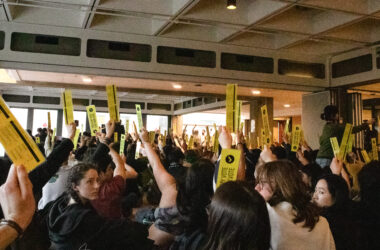As of Jan. 8, Caitlin Salvino, chair of Our Turn, a national student group committed to preventing sexual violence on campuses and advocating for survivors, became the official Students’ Society of McGill University’s (SSMU) Gendered and Sexualized Violence Policy (GSVP) Coordinator. She aims to create a proactive policy to address sexual violence on campus and complement McGill’s Policy against Sexual Violence.
Although SSMU completed the first GSVP draft in July 2017 in accordance with the Community Disclosure Network’s (CDN) original timeline recommendations, initial consultations in Fall 2017 revealed students’ concerns over an underdeveloped survivor-focused framework and the lack of gender-based violence policies.
The CDN—a network for survivors of sexual and gendered violence to disclose their experiences and seek support—was established in February 2017 following incidents involving former SSMU executives. In response to the allegations, the CDN called for the creation of the GSVP and has continued to advise SSMU on relevant cases. According to a CDN member who wished to remain anonymous, the policy’s quality should take precedence over adherence to the proposed schedule.
“Drafting policy like this takes time to do properly,” the member wrote. “[The CDN feels] extremely confident in [Salvino’s] ability to take on this project. She is incredibly well-qualified for this work.”
Salvino will be holding open forums on Feb. 5 and Feb. 12 as well as community-specific consultations in the coming weeks to spark discussion on the policy. The new GSVP draft will be delivered to student groups in March and the final GSVP report will be published on May 31.
“Right now, we are doing consultations and researching into current [sexual and gendered violence] policies and provincial law,” Salvino said. “[Starting a new GSVP draft] is kind of about stepping back, speaking to as many people as possible from many communities, and trying to create a policy that is much more holistic.”
Priya Dube, U3 Arts, and Bee Khaleeli, U2 Arts, will work alongside Salvino as Gender and Sexual Violence Policy Advisors. Their positions will provide context on previous initiatives and recognize McGill student groups that work to address gendered and sexual violence, such as the Black Students’ Network (BSN). To BSN Vice-President (VP) Political Affairs Christelle Tessono, the GSVP is particularly important because people of colour are at greater risk of sexual violence, making it necessary for their perspective to be heard.
“It is important to understand that sexual violence targets everyone […] and to talk about sexual violence without recognizing how it targets every specific body doesn’t do justice to dismantling rape culture,” Tessono said. “[The BSN is concerned about] how we make sure that we hold each other accountable and how SSMU plays a role in creating that culture.”
Salvino praises SSMU as the first student union in Canada to tackle sexual and gendered violence through policy, although she warns that the Society will likely face hurdles in enforcing the GSVP. SSMU VP External Connor Spencer notes the culture of mistrust around SSMU and institutional pushback, especially regarding survivor confidentiality and executive dismissal, as major limitations.
“Quebec Labour [standards] are the superseding documents to all SSMU documents and people are typically not even willing to look into bending those rules or interpreting them in a way that is accessible,” Spencer said. “It’s [also] going to take many years of good executives to combat [students’ mistrust of SSMU] and one policy is not going to fix that, but hopefully [the GSVP] is a first of many steps.”
SSMU has been exploring implementation methods such as training club executives on how to report disclosures, tying club funding to workshop attendance, and encouraging faculties to include points from the GSVP in their own constitutions. Spencer recommends that sexual and gendered violence survivors seek help from SSMU, the McGill administration, and survivor-orientated groups like the Sexual Assault Centre of the McGill Students’ Society (SACOMSS).
“My own definition of a pro-survivor approach is choice, and the ability to make informed choices,” Spencer said. “At the student union level, we can facilitate [student accomodations] a lot better because we have the connections with the [McGill administration] office and know what has come before [….] so that we can better advocate for certain folks.”









